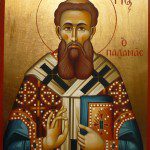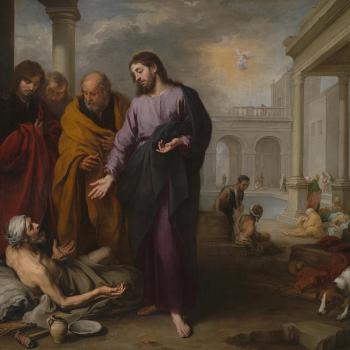This is what is revealed in the incarnation. For in the incarnation, God becomes man, and as one whole person, is both omnipotent and weak. In the incarnation, God has used his omnipotence to prove his omnipotence by making himself weak, a human with all the abilities and powers of a human, while remaining God. By assuming human nature, God showed his power, that he is capable of being both all-powerful and weak, capable of making stones which he, as a person, will be unable to move, because he has assumed human nature with its limitations. The key here is that what is said about him in accordance to his humanity, which includes a human body with the limitations therefore, is being said about him, a divine person, that is God the Word. He is able to make for himself a stone which he cannot move and yet still move it, because in his humanity he will not move it, but in his divinity, he still can.
![Dead Christ by Anonymous (Castoria, Greece) [Public domain], via Wikimedia Commons](https://wp-media.patheos.com/blogs/sites/637/2017/03/Greek_ikon.12_cent.-200x300.jpg)
The paradoxes of the incarnation, the mysteries which transcend human thought, are the way God proves he is God. For in the incarnation, God, the creator, the eternal one proves he is also able to enter time, to act in time, to allow time limit him, indeed, to let himself join in with creaturely being and become a creature who is born of a woman like all other humans. In the incarnation, the undying one shows his power by being able to die. “For he was crucified in weakness, but lives by the power of God. For we are weak in him, but in dealing with you we shall live with him by the power of God” (2Cor. 13:4 RSV).
In the incarnation, we see true strength, the strength which is capable of limiting itself while remaining strong. Jesus affirmed this point when he said that it was his power which allowed him to be weak and to die, and his power to allow himself to be raised again. “No one takes it from me, but I lay it down of my own accord. I have power to lay it down, and I have power to take it again; this charge I have received from my Father“ (Jn. 10:18 RSV). His divine person allows him to assume human nature, become weak and die; what happens to him in accordance to his humanity is united to him and his person. In him we find the true mediator between God and humanity is a person, God the Logos, who is the high priest who knows weakness while he remains strong. “For every high priest chosen from among men is appointed to act on behalf of men in relation to God, to offer gifts and sacrifices for sins. He can deal gently with the ignorant and wayward, since he himself is beset with weakness” (Heb. 5:1-2 RSV).
While we are not omnipotent, and so we cannot be weak and strong in the same way as we find in Jesus, we can and should imitate him by recognizing that accepting our weakness, accepting our limitation, allows us to open up to God beyond ourselves and be filled by grace so as to be made strong. We will be weak in ourselves, but strong thanks to grace, so we will also reflect weakness and strength in ourselves, in inversion to how it is shown in the God-man. This is why we can boast in our weakness, realizing by emptying ourselves of all presumption of internal strength, we can become like Christ, open to the true power of God in our lives, and realize through the grace which not only perfects our nature but lifts us up beyond it, that we truly become not only strong, but godlike:
His divine power has granted to us all things that pertain to life and godliness, through the knowledge of him who called us to his own glory and excellence, by which he has granted to us his precious and very great promises, that through these you may escape from the corruption that is in the world because of passion, and become partakers of the divine nature (2Ptr. 1:3-4 RSV).
The incarnation, then, serves as the proof of God’s omnipotence, and indeed, through his omnipotence, his wisdom. For in it the divine Logos, divine logic, confronts human questions and logic, and shows the answer which human reason is incapable of grasping in and of itself without help from God’s activity. Without it, we could say God is omnipotent, but we would not likely realize how weakness is able to be used as proof of omnipotence instead of its lack. The incarnation shows that the answer requires the hypostatic union, a union which allows God to be all powerful and weak, and therefore all powerful, because it is one person who is both God and man. For, as St. Bonaventure wrote, “The Incarnation is a work that derives from the first principle, in so far as it is redemptive, in a most appropriate, all-embracing, and complete way. It befits His wisdom to work appropriately, His bounty to work in an all-embracing way, and His power to work perfectly.”[1] God has become man to redeem and deify humanity, lifting us in our weakness, indeed, through our acceptance of our weakness, so we can receive the deifying strength of grace. With his Divine Logic, the Logos, how showed what human logic cannot do. The Logos remained God while becoming man. Through the power of his omnipotence, he let others take hold of him, confine him, kill him and send him into the abode of the dead, to the edge of being, while remaining divine and all-powerful. In him we find the powerful embrace of the whole of creation in a way which only divine power can do, a power manifested through weakness, so that we, in our weakness might join ourselves to him and find the true meaning of power which transcends all human reason.
[1] St. Bonaventure, Breviloquium. trans. Erwin Esser Nemmers (London: B. Herder Book Co., 1946), 114.
Stay in touch! Like A Little Bit of Nothing on Facebook:
A Little Bit of Nothing













